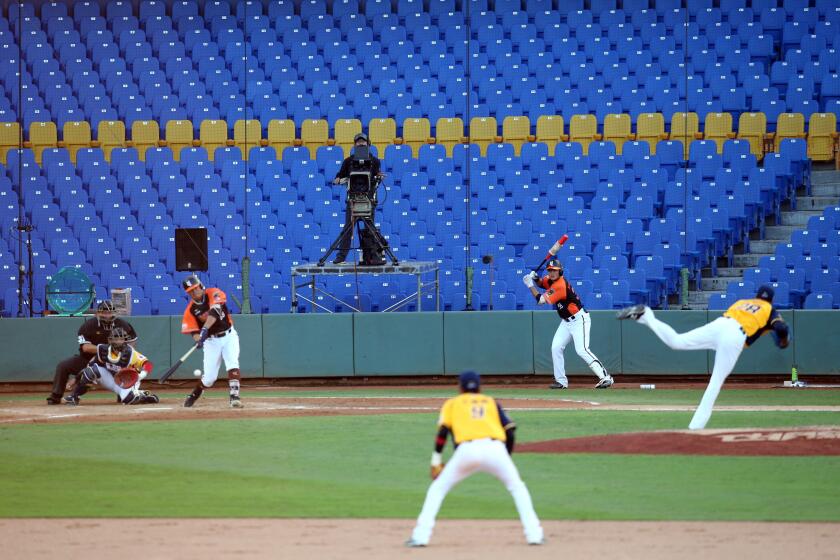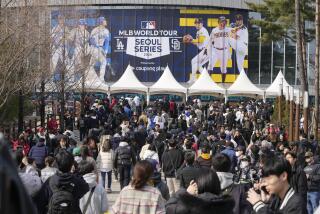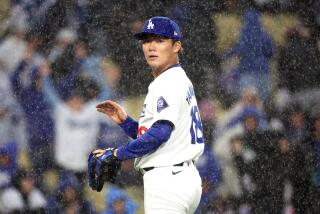Missing Major League Baseball? Here’s Korean baseball to the rescue
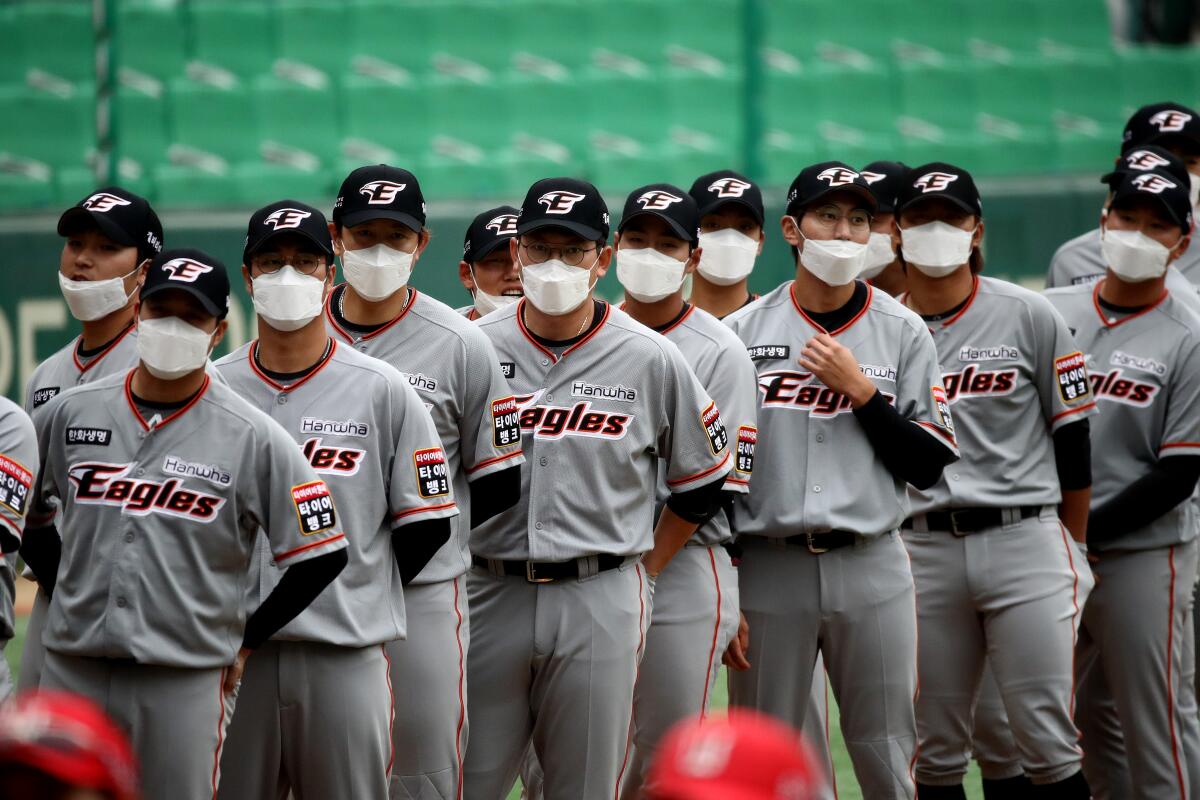
SEOUL — Former U.S. major league player Kim Hyun-soo sent the ball cracking over the left-field fence, marking the first home run of the long-awaited season of South Korea’s beloved baseball league.
But instead of basking in thunderous applause and hollers from adoring fans, Kim loped across home plate to a smattering of claps from a few dozen reporters and league employees. After scoring two runs for his Seoul-based LG Twins, Kim approached a teammate who waited with his arms up, but caught himself at the last second, narrowly avoiding a high-five — banned by the league as a coronavirus precaution. He bumped elbows with another teammate.
Most of the stadium’s 25,553 seats — a tough get in a normal year for a game between the Twins and archrival Doosan Bears — were empty.
Baseball returned to South Korea under drizzly and overcast skies Tuesday, a rare professional sporting league to resume games while much of the world remains under lockdown with no end in sight to the COVID-19 pandemic. The five-game opening day showed South Korea testing the waters for a cautious return to normalcy on a day the country reported just three new cases of the coronavirus, a sign that the virus’ community spread has largely been halted.
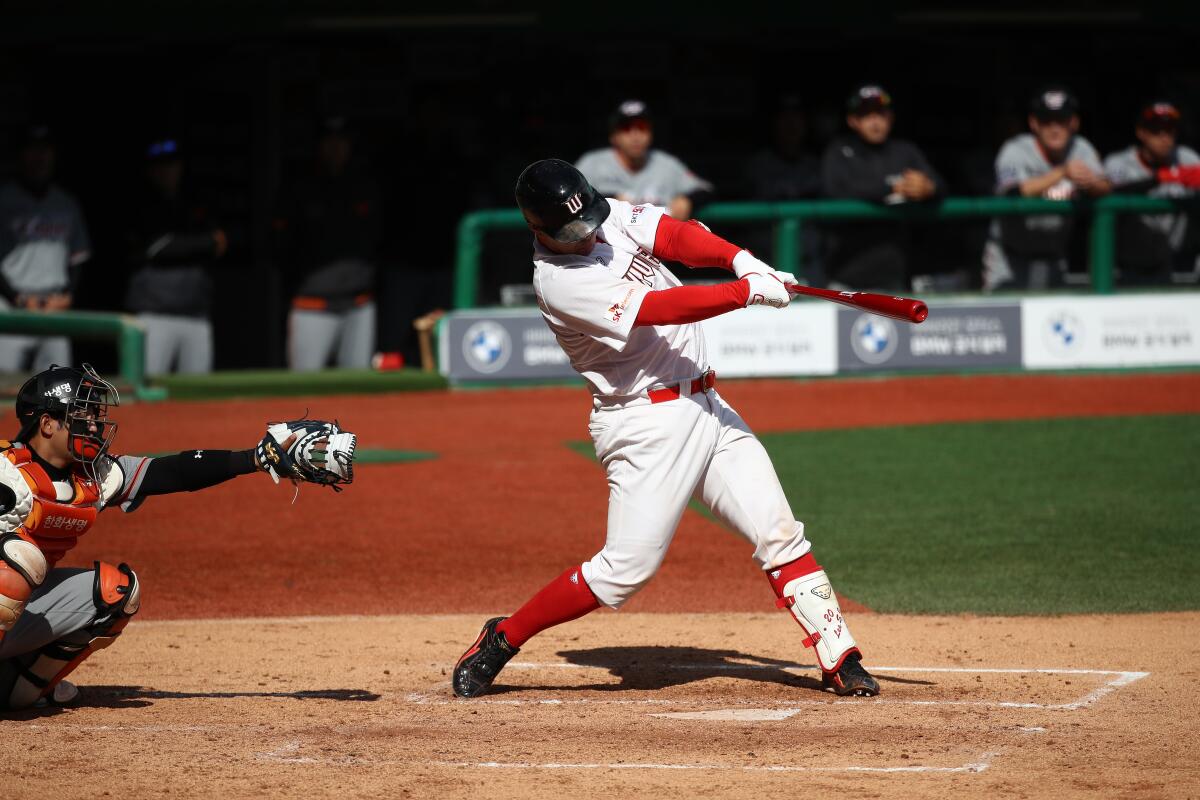
With ESPN reaching an eleventh-hour deal to broadcast Korea Baseball Organization games, a host of U.S. fans starved for live sports were turning to the Korean league, with its distinct culture and avid fandom. Taiwan’s Chinese Professional Baseball League, which started up April 11, has also gained a following among Americans watching online.
“Major League Baseball teams [in the U.S.] are more corporate, a little more sterile, not as passionate. The KBO feels like a college football game,” said Dan Kurtz, a longtime fan behind the site MyKBO.net. Kurtz said he was being inundated with messages from sports-deprived Americans in the lead-up to the season. “The KBO is going to fill that void, and that’s awesome.”
The 144-game season, originally set to begin in late March, was pushed back a few times before getting underway with a number of precautions. A 44-page manual distributed to the league’s 10 teams outlined detailed protocols — including bans on high-fives and spitting, and the minimizing of player contact with the general public. All games will initially be conducted without spectators; the league has said it will consider phasing in a limited number of fans at a later date.
On the field in Seoul’s Jamsil Baseball Stadium on Tuesday, umpires and base coaches wore masks and gloves. The mascot for the home-team Twins — twin robot boys named Lucky and Star — also wore masks, as did the team’s cheerleaders and a drum squad that did its best to make up for the absence of fans. When they fell silent, an uncanny hush blanketed the stadium, interrupted only by the whiz of nearby traffic and the satisfying thwack of hits.
The quiet was especially odd in a stadium typically filled with songs and chants customized to each hitter and situation and boisterously belted out by fervent fans throughout the game.
“Without them, it’s a totally different animal,” said Twins pitcher Tyler Wilson, formerly of the Baltimore Orioles, who has been playing in South Korea since 2018. “Their energy and their passion and how into it they are, from the first pitch to the end, is what makes the games so special.”
Wilson, who didn’t play in Tuesday’s opening game, said that, during this year’s pre-season games, it was so quiet he could hear the broadcasters’ commentary, conversations in the field and in the dugout, and even the sound of his own spikes going into the dirt.
Precautions began long before opening day. Former Angels catcher Hank Conger, starting his first season as a battery coach with the Busan-based Lotte Giants, said players had been dining with plexiglass barriers between them in the lunchroom and wearing masks on the bus. Former teammates in the U.S. were eyeing the situation in Korea enviously, he said.
“For us to finally start is surreal,” he said. “Everybody sees my Instagram and sees us getting ready for the season, and they’re saying, ‘I can’t believe you guys are playing.’”
At the Giants’ game against the KT Wiz in Suwon — the teams are named after corporate sponsors rather than home cities — in lieu of a first pitch, a young fan encased in a clear plastic bubble shaped like a baseball walked from the mound to the home plate. In Incheon, where the Hanhwa Eagles played the SK Wyverns, banners with photos of fans in masks filled the bleachers to give the impression of crowds.
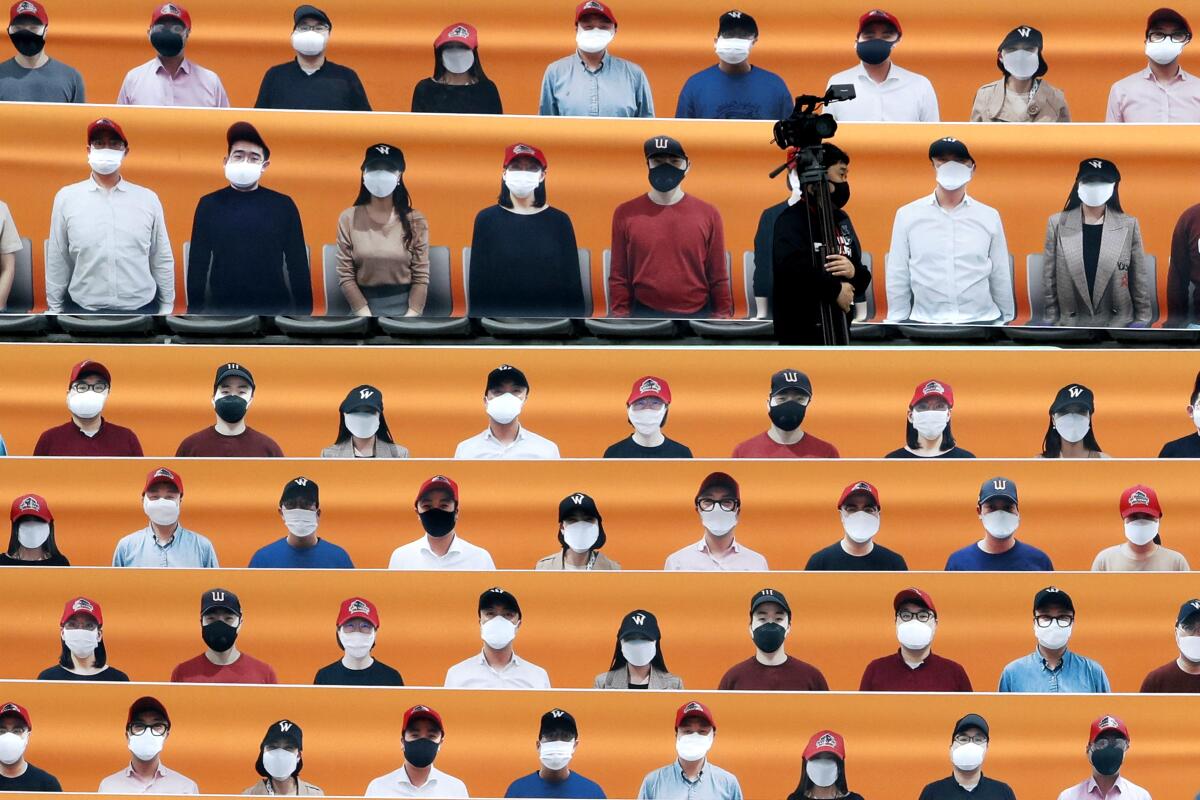
Kim Tae-hyoung, the manager of the defending champions, the Doosan Bears, told reporters he wasn’t quite sure how the coronavirus-related measures and delays would affect his team, but at the end of the day, he just wanted to win.
“This is a first for me too,” he said.
A reporter asked if he had remarks for viewers from the U.S. watching KBO games for the first time.
“Do I have to say that in English?” he said, to laughs. “Give us a lot of love please.”
Outside the closed stadium gates, 25-year-old Kim Gwang-ho was among a handful of fans who showed up wearing team hats and jerseys. The longtime Twins fan watched the game on his cellphone while listening to what sounds he could make out over the stadium walls — and he was hoping for a selfie with a player after the game.
“I hope this corona situation ends so everyone can come and cheer them on, in time for fall baseball,” he said. “I hope they win the Korean series this year.”
Former Mariners pitcher Ariel Miranda describes the surreal experience of playing in the Chinese Professional Baseball League amid the coronavirus outbreak.
After pulling ahead with Kim Hyun-soo’s early home run, the Twins beat the Bears 8-2. By the end of the nearly three-hour game, gray skies had given way to a picture-perfect sunny day.
Kurtz of MyKBO.net, who is a Bears fan, said all of Korean baseball and its fans scored a win Tuesday with the international attention being paid to a league normally overshadowed by U.S. Major League Baseball. He said he hoped the country’s overlooked sports would receive some of the acclaim its music and movies had been getting of late.
“Prior to today, it was very niche.... ‘Parasite’ won,” he said, referring to the South Korean Oscar-winning film, “so KBO, let’s do this next.”
More to Read
Sign up for Essential California
The most important California stories and recommendations in your inbox every morning.
You may occasionally receive promotional content from the Los Angeles Times.
